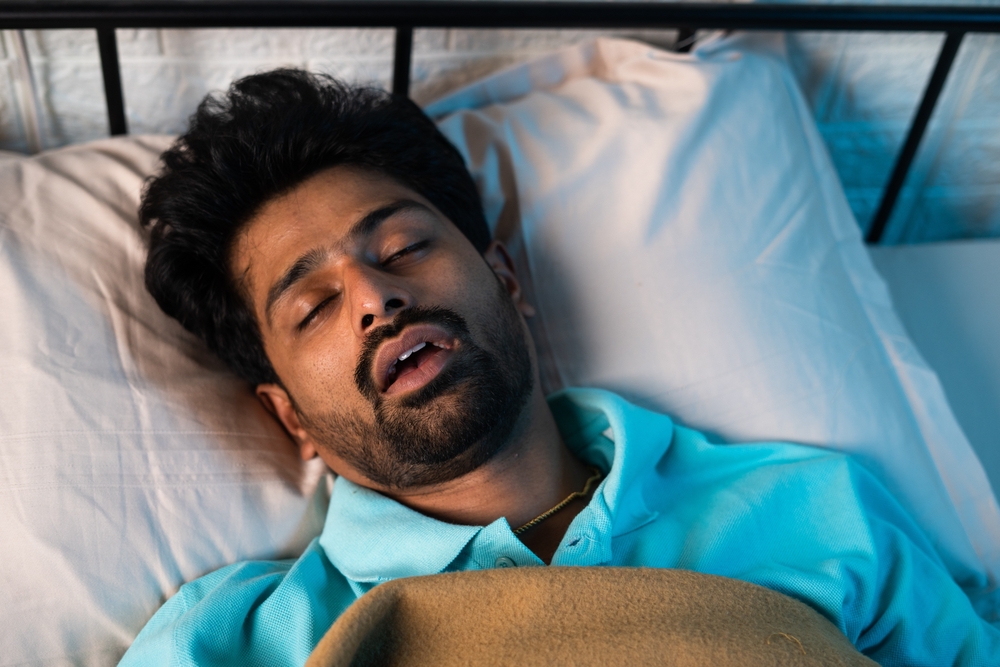
Do you snore frequently? Does your snoring keep your partner from getting a good night’s sleep?
While occasional or mild snoring often isn’t a cause for concern, loud, persistent snoring may signal sleep apnea, a serious sleep disorder.
Keep reading to learn more about why your snoring could be a sign of sleep apnea.
What is Snoring?

Snoring is the snorting, rattling, or rumbling sound made when tissues in your throat, mouth, and nose vibrate. The muscles supporting these tissues usually relax during sleep.
But sometimes, they can relax too much and cause the tissues to collapse, partially or completely blocking your airway. When you breathe, air squeezes past the obstructing tissues and makes them vibrate, which produces the sound known as snoring.
Many people don’t realize they snore until a partner or family member mentions it.
What is Sleep Apnea?
Sleep apnea is a sleep disorder that occurs when your breathing stops and starts while sleeping. The brief pauses in breathing can last 10 seconds or more and happen hundreds of times throughout the night.
Each time you stop breathing, your brain jolts you awake momentarily so you can resume breathing. When breathing starts again, it can cause a gasping or choking sound.
You likely won’t remember waking up. However, these episodes can affect deep, restorative sleep, leaving you sleepy, tired, and groggy the next day.
When Could Snoring Be a Sign of Sleep Apnea?
Not everyone who snores has apnea. However, loud, persistent snoring, interrupted by pauses in breathing and gasping, snorting, or choking sounds, could be a tell-tale sign of sleep apnea.
If snoring is also accompanied by any of these sleep apnea signs, it’s time to see your ENT specialist at Southern Indiana ENT for further evaluation:

- Daytime fatigue
- Insomnia
- Morning Headaches
- Excessive daytime sleepiness
- Restless sleep
- Night sweats
- Crankiness or mood swings
- Recent weight gain
- Frequent need to pee at night
- Waking up feeling unrefreshed
- Forgetfulness or poor concentration
- Sore throat or dry mouth upon waking
- Anxiety or depression
- Sexual dysfunction
It’s important to note that you can’t tell by your symptoms alone whether you have apnea or its severity. The only way to know if you have sleep apnea is to see an ENT specialist.
What Makes Your Snoring High-Risk?
Chronic, loud snoring combined with any of the following factors can put you more at risk of sleep apnea:
- Being male
- Older age
- A narrowed airway
- Smoking
- Being overweight
- Drinking alcohol
- A large neck circumference
- Nasal congestion
- Use of tranquilizers or sedatives
- Medical conditions such as congestive heart failure, type 2 diabetes, PCOS, high blood pressure, asthma, prior stroke, or Parkinson’s disease
If you have one or more of these risk factors in addition to snoring symptoms, it’s important to see an ENT specialist to determine whether you have sleep apnea.
How is Sleep Apnea Diagnosed?
Your ENT specialist may order a sleep study if they suspect you have sleep apnea. Depending on your symptoms, a sleep study can be done at home or a sleep center.
During a sleep study, sensors are attached to your body to monitor your oxygen levels, breathing patterns, eye movement, brain waves, and heart rhythms as you sleep. Your ENT specialist uses the data collected to determine whether you have sleep apnea and, if so, how severe it is.
If you’re diagnosed with sleep apnea, treatment can ensure you get restful sleep every night and eliminate or reduce apnea symptoms, including snoring.
Why Should You Not Ignore Snoring and Sleep Apnea Symptoms?
Sleep apnea can lead to long-term health complications. That’s why it should be detected and treated as soon as possible.
Untreated sleep apnea can increase your risk of the following health conditions:
- Acid reflux
- Stroke
- Heart failure
- Heart disease
- Type 2 diabetes
- High blood pressure
- Adult asthma
- Weight gain
- Depression
- Metabolic syndrome
- A shortened lifespan
Snoring and sleep apnea can also disrupt your partner’s sleep, which can be frustrating for a relationship. Dangerous complications of snoring linked to sleep apnea can cause you to fall asleep when operating heavy machinery or driving due to excessive daytime drowsiness.
Why is Snoring and Sleep Apnea Treatment Important?
Quality sleep is critical for your physical and mental health. Snoring and sleep apnea treatment can dramatically improve your sleep quality, ensuring you wake up feeling refreshed.
Once you get a good night’s sleep every night, you’ll feel more energized, focused, and alert during the day. Snoring and apnea treatment can also considerably lower the risk of developing serious, long-term health conditions.
Moreover, getting treatment can reduce snoring and apnea symptoms, ensuring peaceful and more restful nights for you and your partner. This can help you maintain a strong, deeper, and more fulfilling connection.
How is Snoring and Sleep Apnea Treated?

There are different treatment options for sleep apnea. Your ENT specialist at Southern Indiana ENT will determine the best treatment based on your sleep apnea’s severity and underlying cause.
Your ENT specialist may recommend a dental appliance to reposition your tongue or jaw and keep your airway open while you sleep, alleviating snoring and other apnea symptoms. They may also suggest a minimally invasive procedure such as VIVAER or Latera to reduce nasal airway obstruction and improve breathing.
Where structural issues cause airway blockage, you may need surgery to address the obstruction, improve breathing, and relieve snoring and apnea. Your ENT specialist may also help you implement lifestyle changes such as quitting smoking, dieting and exercising to lose weight, and avoiding alcohol and sedatives to reduce snoring and sleep apnea episodes.
Our experienced doctors at Southern Indiana ENT specialize in diagnosing and treating sleep breathing problems such as snoring and sleep apnea. We offer a range of effective treatment options that can eliminate or dramatically reduce sleep apnea symptoms, including snoring, and improve your quality of life.
Do you snore and suspect you may have sleep apnea? Schedule your appointment at Southern Indiana ENT in Columbus, Seymour, Franklin, and Greenwood, IN, today to get on the path to better sleep and a healthier future.

